Dieppe is a fishing port on the Normandy coast of northern France. Historically a major fishing hub, it is still home to a large ferry port and one of the busiest ports in Europe. The area has a past history of industrial enterprise, but today there are only fading memories. One of the past companies was Laboratories Biomarine, which sold medicine based on sea water. Marinol was the company’s flagship product. The founder of the company was Marcel Bosquet, who developed two derivatives from Marinol. The first was Plasmarine, in syrup form and the second was Ionyl, made into lozenges. In the 1930s, the laboratory employed 100 people.
Activity was suspended during WWII and the German Occupation. After the war, the products Marinol and Plasmarine were promoted for fatigue and lack of appetite in adults and children. Ionyl was promoted for physical and intellectual fatigue, overwork, lack of concentration in adults and adolescents. The major components of Marinol were advertised as calcium phosphates, seaweed iodiferous, disodium methylarsinatem and isotonic seawater. Plasmarine was advertised to contain organic and mineral calcium, phosphoric acid and phosphates, iodine, glygerophosphoric manganese and isotonic seawater.
In 1947 Laboratories Biomarine developed a plan to send postcards to doctors telling of the benefits of the products. The new twist was that there was a theme to a series of postcards, usually sent from locations outside of France. While this approach might sound familiar to those acquainted with the “Dear Doctor” postcards, the Laboratories Biomarine campaign started 5 to 7 years before Abbott Labs. From 1947 to 1966, Biomarine mailed from 6 to 16 cards per year to 30,000 doctors in France and North Africa. Postcard “tours,” representing a historical or cultural journey, were created, with the first card having a map that shows the planned route.
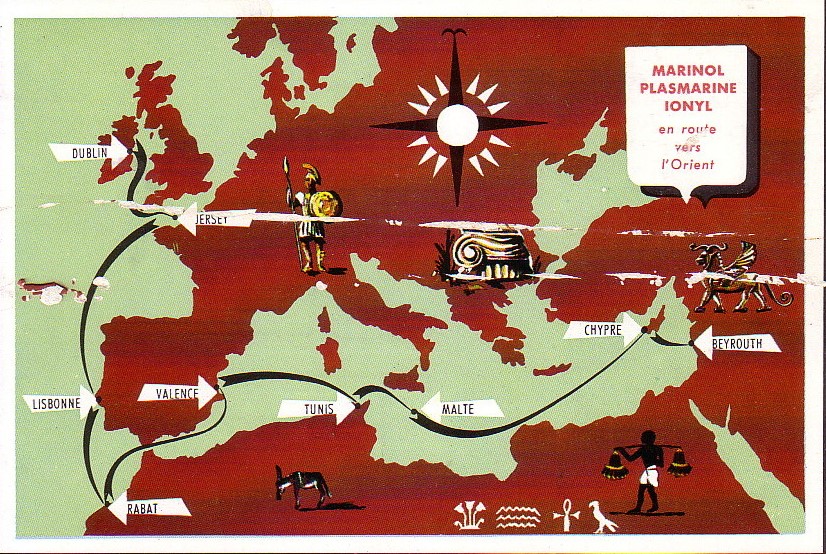
This card shows the front of the initial card in the series To The East. The postcard series had starting and ending points, along with story lines that flowed from one stop to another, usually with nine destinations. In To The East, the initial postcard was mailed from Dublin, Ireland. The rest of the series were mailed in Jersey, Portugal, Morocco, Spain, Tunisia, Malta, Cyprus, and ended in Beirut, Lebanon.
At least 19 different “tours” were organized by La Biomarine between 1947 and 1966 touting their three drugs of Marinol, Plasmarine and Ionyl. Other tour titles included A Century after Livingstone, Christopher Columbus in the West Indies, To the East, In the Steps of Marco Polo, French West Africa, Trip in Southern Africa, and In the Wake of Bougainville. At least two other pharmaceutical companies (Rhone-Poulenc and Squibb) later used the “tour” motif in their advertising campaigns. Beyond the series cards, Laboratories Biomarine sent other individual postcards from, among other origins, from Ethiopia and Bermuda.
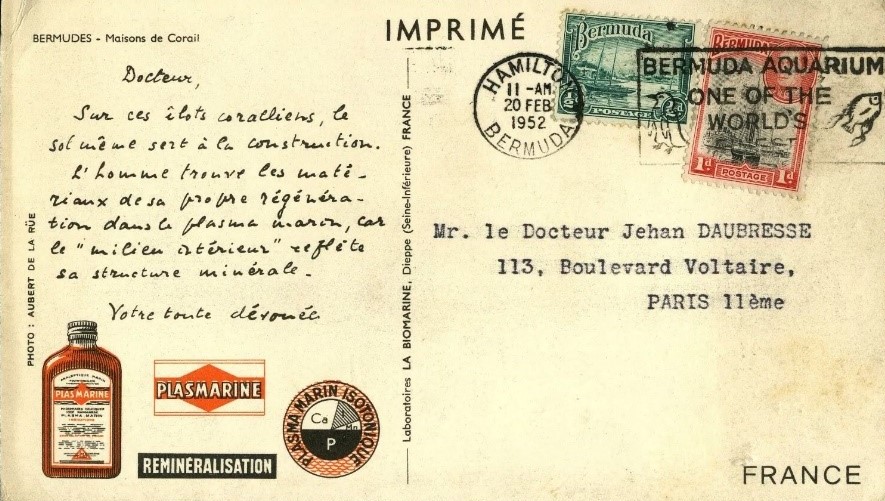
There were several different types of messages on the mailed cards. The first type was similar to the Abbott “Dear Doctor” cards in that they included a faux-handwritten message from the location and about the use of the advertised product.
Another type was a printed general comment on the benefits of nutrition and seawater based minerals,
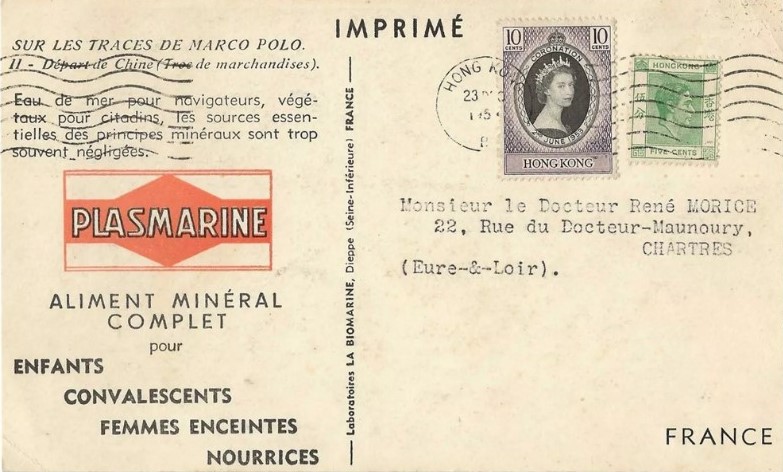
while another was more of a general description of the benefits from using the advertised products.
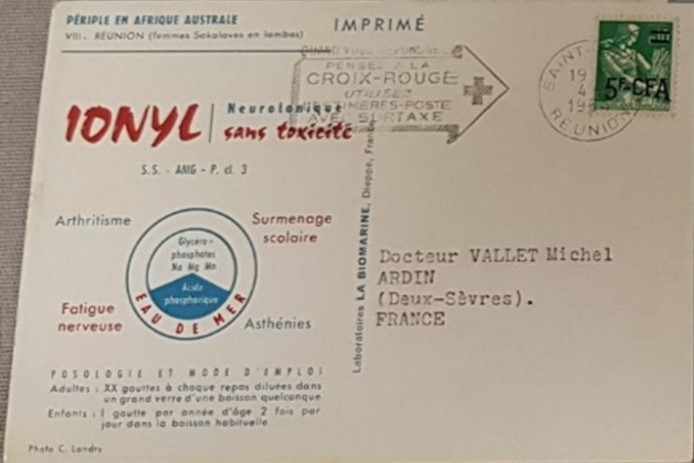
Not having seen the full range of these cards, there may be other formats as well.
All cards were printed locally in Dieppe, with foreign stamps imported to that city where cards were assembled and readied for mailing. After packaging the items in bundles, Biomarine then forwarded the postcards by surface mail to the destination countries in order to be mailed.
In 1975, Laboratories Biomarine sold their pharmaceutical specialties and became a logistics company in the pharmaceutical field. Since 2000, now named La Biomarine Logistique, the company offers promotional logistics and services including marketing, distribution of medicines and health product samples, documentation management, distribution of promotional items, order preparation (assembly of good into kits/boxes), shipping management and convention/trade show related services. In 2009, the company was renamed LNB Logistique and continues to provide services related to storage and distribution of goods, and is a pharmaceutical product depository.
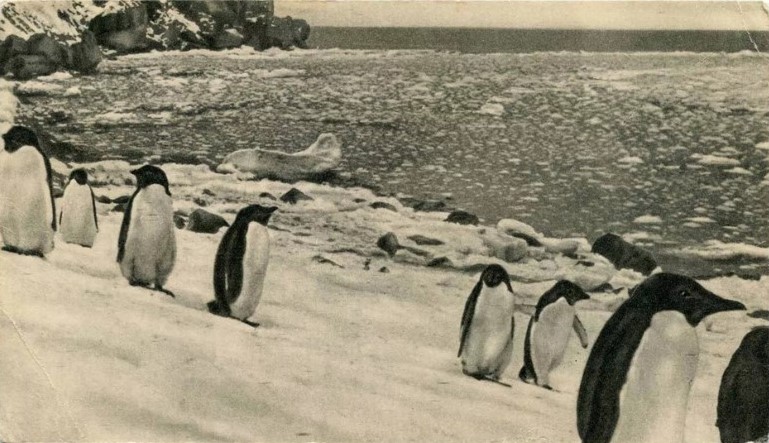
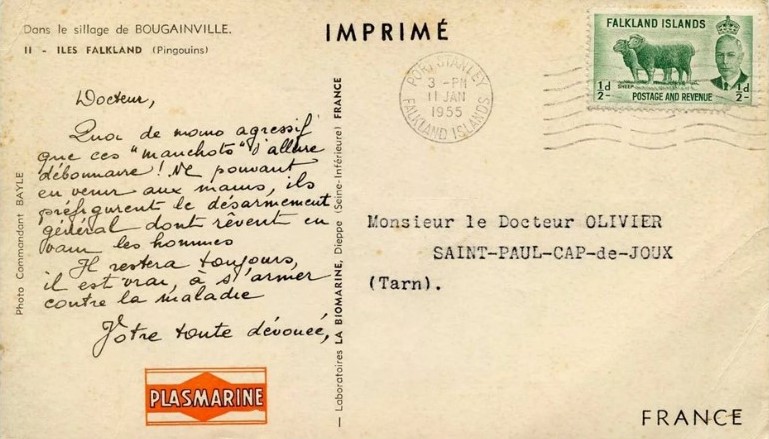
Interesting to see the King George VI stamp used alongside the one depicting Queen Elizabeth II on the card mailed from Hong Kong.
Very interesting article, Richard. I have a few of the “Dear Doctor” cards sent to and from cities here but did not know about these cards being sent in Europe. Thank you!
These are amazing. I have not seen these types of cards before. A treasure for sure.